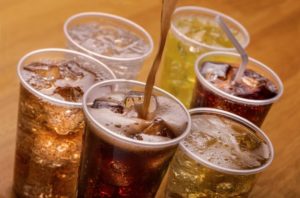
When you open a carbonated drink, the pops and fizzles are just as inviting as the crisp, refreshing taste and feeling when it hits your tongue. Even though most people find beverages such as soda and sparkling water irresistible, they’re not good for your teeth. In fact, your dentist in Lakewood recommends cutting back on these enamel-harming drinks to preserve your smile. Read on to learn how carbonated beverages can harm your smile and some alternative substitutions you can make.
The Science Behind Carbonated Drinks
Have you ever wondered what makes carbonated drinks pop on your tongue? The primary ingredient is dissolved carbon dioxide. This gas actually easily combines with water at average temperatures, but it doesn’t stay bonded and mixed for long. Eventually, the carbonic acid will escape the mixture, which causes the well-known “fizz” sound when you open a soda or your favorite sparkling water.
Unfortunately, the acid that makes these beverages so unique is the same substance that makes it not good for your teeth. That leaves many people with the questions of “what’s the worst that can happen?” and “how can sparkling water be bad if it doesn’t even contain sugar?” A dentist in Lakewood sets the record straight.
Yes, Carbonation Can Harm Your Teeth
The enamel on your teeth is the outermost layer that protects the more fragile inner-structure. Beneath it lies the dentin, which is sensitive and yellow in color, and the inner-chamber, which houses a collection of nerves and tissue called the pulp. Even though the enamel is the strongest substance found in the body (even stronger than bone!), its primary weakness is acid.
Excess consumption of acid foods and drinks and accumulation of acid-producing harmful oral bacteria are primary causes for the development of common oral health problems such as cavities and infections. Unfortunately, once your enamel is deteriorated, it can’t grow back, which is why so many dentists recommend avoiding consuming these drinks as well as foods that attract harmful oral bacteria to preserve the protective outer layer of your teeth.
Refreshing Alternatives For Your Smile
Unfortunately, no carbonated drink is good for your teeth, even if it doesn’t contain any sugar. However, if you were to consume carbonated beverages, sugar-free mineral water and sparkling wine may be the safest bet for your smile. This is because they contain little to no sugar, which is known to play a vital role in the formation of tooth decay. If you do consume these, be sure to wait at least 20 minutes before brushing your teeth. This will be enough time to allow your enamel to re-harden, preventing it from excessively eroding while it’s softened by the carbonation.
At the end of the day, water is the best beverage for your smile. Even though carbonated drinks may be tempting, it’s best to avoid anything that can put your dental health in jeopardy if it’s possible. If you’re wondering how your consumption of these beverages is impacting your teeth, you can always speak with your dentist during your next checkup and cleaning. They may also be able to provide you with tips and tricks on how to optimize your oral health so you can enjoy a problem-free and beautiful smile for the rest of your life!
About the Author
Dr. Drew Vanderbrook has always been passionate about dentistry, which is why he decided on his career when he was just a child. He is currently working on completing his Fellowship in the Academy of General Dentistry and has been awarded the New Dentist of the Year award by Dallas County Dental Society. He regularly completes continuing education courses to stay up-to-date with the latest advancements in his field and to provide his patients with the highest quality of dental care. For questions or to schedule a checkup and cleaning, visit Vanderbrook Family Dentistry’s website or call 214-821-5200.
